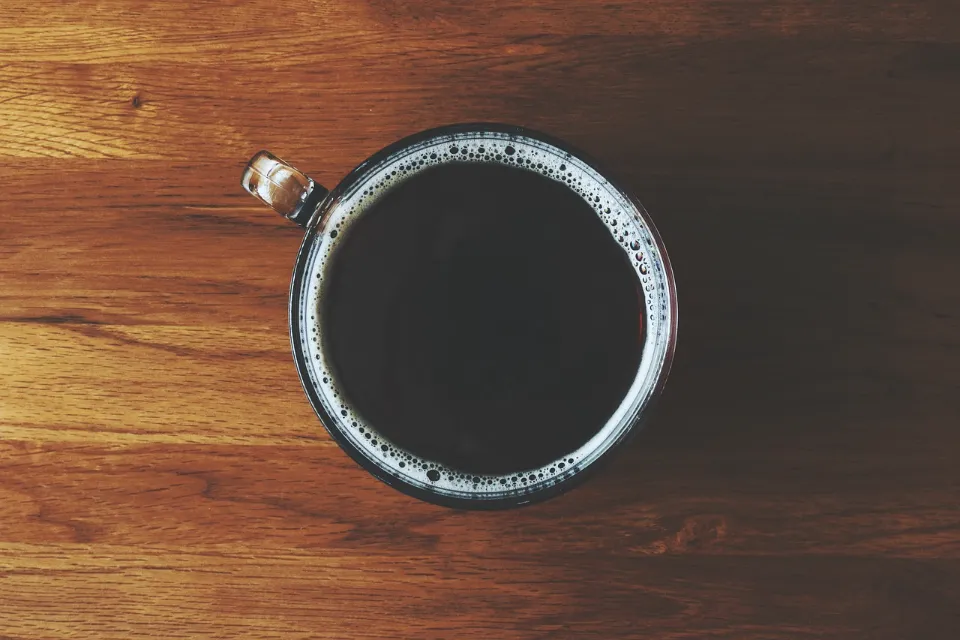Black coffee is the basis of many other coffee types, though it’s bitter in taste it has many advantages to your body. Now let’s get closer to this coffee.
What is Black Coffee?
Roasted coffee beans are used to make black coffee. The beans are ground and soaked in water, which releases their flavor, color, caffeine content, and nutrients. Coffee can be served cold in addition to being frequently served hot.

Throughout the world, including in the US, coffee is frequently consumed with breakfast. Given that it contains caffeine, which has stimulating effects and may make people feel more awake, it is preferred in the morning.
For creaminess, to lessen the bitterness, or for both, many people add creamer, milk, half-and-half, sugar, or sweetener to their coffee. Numerous beverages, like cappuccinos, lattes, and macchiatos, start with black coffee as their base.
There are many varieties of black coffee. The origin of the beans and the method of roasting, for instance, affect the type. You can also buy decaffeinated coffee, which is produced by chemically extracting the caffeine from roasted coffee beans.
Nutrition
One cup (240 mL) of black coffee provides:
- Calories: 2
- Protein: 0 grams
- Fat: 0 grams
- Carbs: 0 grams
- Fiber: 0 grams
- Caffeine: 96 mg
- Riboflavin: 14% of the Daily Value (DV)
- Niacin: 3% of the DV
- Thiamin: 3% of the DV
- Potassium: 3% of the DV
But keep in mind that 96 mg of caffeine per cup (240 mL) of cold brew coffee may contain significantly more caffeine depending on the brew time.
Other vitamins, minerals, and polyphenols—beneficial plant compounds—are also present in coffee in trace amounts. One of them is chlorogenic acid, which might be beneficial for your health in terms of reducing inflammation and regulating your blood sugar.

Of course, the amount of nutrients and polyphenols will differ depending on the brand, kind, and brewing method of the coffee.
How to Make It
Water and ground coffee are the only two ingredients required to make black coffee.
You can buy pre-ground coffee or grind your own beans from whole, roasted coffee beans. Finding the coffees that best suit your palate may require some time and experimentation due to the large number of available varieties.
There are several ways to brew your preferred type of ground coffee after you’ve made your selection. Here are some of the most common ways:
- Pour-over or drip. Hot water is poured over ground coffee in a paper filter, and brewed coffee drips into the pot below. Pour-over style electric countertop coffee makers are the most common. You can also buy cone-shaped filters for hourglass-shaped flasks.
- French press. A pitcher of hot water and ground coffee steeps for a while. A plunger is then slowly lowered into the pitcher, forcing the brewed coffee to the top while trapping the grounds below. Many claim that this technique produces the most flavor.
- Percolator. On the stove, a special two-chamber pot with coffee and water in the bottom is placed. Brew coffee accumulates in the upper chamber as the boiling water is forced up through the coffee grinds. For espresso, this technique is frequently employed.
- Coffee pods. Coffee pods can be used in automatic beverage dispensers from brands like Keurig and Nespresso. For a more environmentally friendly choice, you can also buy reusable coffee pods that you can then fill with your own coffee.

- Instant coffee. To make instant coffee, simply add water to coffee crystals. It can be produced without removing the coffee grounds because it is made by drying brewed coffee. Although it’s practical, most people concur that drinking black coffee this way isn’t the best tasting.
- Iced. Any method of brewing coffee will work to make iced coffee. The coffee is chilled and typically served over ice.
- Cold brew. Cold water and ground coffee is left to brew in the refrigerator, often overnight. You can filter it, use cheesecloth, or French press to strain it. Cold brew coffee generally tastes smoother and is higher in caffeine given the long brew time.
Potential Benefits
Drinking coffee offers several potential benefits.
Could Help Prevent Cancer
According to some research, drinking coffee may lower your risk of getting some cancers.
One review of 28 studies on coffee and cancer risk found that the more coffee the study participants drank, the lower their risk of liver cancer and endometrial cancer.
Similar results were seen in another review, which also suggested that coffee may lower the risk of colorectal cancer. This study, however, also found that coffee had no impact on overall cancer risk.
To fully understand how coffee consumption may impact cancer risk, more research is still required.
Might Protect Against Neurodegenerative Conditions
Coffee is frequently consumed to increase alertness. In actuality, the caffeine it contains is regarded as a nootropic, or a substance that improves cognition or the brain.
Because of this, many researchers wonder if the beverage might offer protection against dementia brought on by aging and Alzheimer’s disease.
Coffee appeared to guard against the progression of Parkinson’s disease, according to one observational study involving 360 people.

More than 2,500 people aged 60 and older were included in a study of observational data that looked at their coffee consumption. It associated caffeinated coffee with increased mental performance. Decaf coffee, however, did not show any similar advantages.
Coffee did not seem to increase the risk of cognitive decline, according to a thorough review. Still, neither did it find a strong link between coffee and a decreased risk of cognitive decline.
Furthermore, another review found an association between coffee intake and a reduced risk of Alzheimer’s disease.
In order to better understand how coffee may affect the risk of neurodegenerative diseases, more high-quality research is required.
Could Prevent Cirrhosis
Coffee seems to provide some defense against liver cancer and liver cirrhosis, a type of advanced chronic liver disease characterized by fibrosis. The scarring and eventual demise of liver tissue is known as fibrosis.
Several studies have noted that drinking coffee may enhance liver health. For instance, a study of individuals with liver disease discovered that those who drank 4 cups (960 mL) or more of coffee daily had a lower risk of developing liver cirrhosis than those who did not.
Furthermore, a physician mentions in one article that he recommends his liver disease patients drink 2–4 cups (480–960 mL) of drip coffee every day. He asserts that doing so slows the disease’s development into cirrhosis.
The positive effects of coffee on the liver are thought to be due to caffeine. Even so, more study is required.
Can Improve Mood and Concentration
Black coffee is frequently consumed to boost energy. I personally feel more awake after I have my first cup of coffee in the morning.
One study in 59 adults compared the effects of regular coffee, decaf coffee, and a placebo drink on mood and brain function.
When compared to a placebo, regular coffee was found to speed up thinking and boost alertness. More so than decaf coffee, it also improved test accuracy and lessened fatigue and headaches.
Decaf coffee drinkers, however, also reported feeling more alert than those in the placebo group. This could mean that decaffeinated coffee itself has a placebo effect, or that compounds in coffee besides caffeine may be involved in its cognitive effects.

Might Reduce Diabetes Risk
Coffee consumption may also help reduce your risk of developing type 2 diabetes.
For instance, one study discovered that drinking 3–4 cups (720–960 mL) of coffee per day may help prevent type 2 diabetes. This may be because coffee contains both caffeine and chlorogenic acid.
Impressively, a thorough analysis of 28 studies involving more than 1.1 million participants discovered a definite dose-dependent relationship between coffee consumption and type 2 diabetes risk.
The risk of type 2 diabetes was highest in those who never or infrequently drank coffee, but it decreased with each additional cup (240 mL) drank daily, up to and including 6 cups (1.4 liters), until it was no longer present.
These researchers also found that drinking decaf coffee reduced diabetes risk. This suggests that compounds other than just caffeine may play a key role when it comes to this promising benefit.
It’s important to remember, though, that any diabetes-fighting benefits coffee may have for you are likely to be countered by adding sugar to it or consuming other sugary coffee beverages.

Other Potential Benefits
Coffee intake offers several other potential benefits, such as:
- Weight loss. Coffee consumption may slightly increase your metabolic rate, or the number of calories you burn while at rest. You might be able to burn fat and lose weight by doing this. Additionally, there is some evidence that suggests coffee may have appetite-suppressing properties.
- Performance-enhancing exercise. Caffeine gives you more energy and might help you perform better physically. One review associated caffeine intake with better muscle endurance and strength, more power during strength training, and improved cardio endurance.
- Antioxidant-rich. Coffee has antioxidant levels comparable to those of fruits and vegetables, which probably explains why it has so many health advantages.
Potential Downsides
When drank in moderation, black coffee doesn’t appear to have many drawbacks.
Nevertheless, consuming too much caffeine, whether it comes from coffee or other drinks like soda and energy drinks, can have unpleasant side effects like insomnia, anxiety, a rapid heartbeat, upset stomach, headaches, and nausea.
Caffeine intake for healthy adults should generally be limited to 400 mg daily or less. If the only caffeinated drink you have is coffee, that’s about 4 cups (960 mL).
Limit your daily caffeine intake while expecting or nursing to about 200 mg (2 cups or 480 mL of coffee). You may also need to restrict your caffeine intake if you take certain prescription drugs, such as birth control, heart medications, and antibiotics.
The best course of action is to consult your healthcare provider if you fit into one of these categories. The amount of caffeine that is safe for you to consume can be more precisely determined with their assistance.

Health organizations also advise children and teenagers to consume as little caffeine as possible. However, there are no official guidelines at this time.
Furthermore, it should be noted that some people experience stomach irritation from black coffee because of its moderate acidity.
Last but not least, coffee may have a diuretic effect, increasing the amount of urine you produce. Additionally, it might induce a laxative effect in some people by drawing liquid into their digestive tracts.
Conclusion
Although black coffee has some shortcomings, it’s still a healthy and popular beverage. Maybe the reason I’m not willing to have it is the bitter flavor.
Related Reading
Why Coffee Bloats You & How to Avoid
Does Coffee Affect Your Weight
Instant Coffee: Healthy Or Not?
FAQs
Is Black Coffee Just Coffee And Water?
Black coffee is simply a mixture of water and coffee without any cream. It should be served without any additional flavors like honey, cream, or milk. The addition of these ingredients may change the coffee’s aroma and color, turning it lighter-brown or white.
Is Black Coffee Different than Regular Coffee?
Black coffee is simply coffee that is normally brewed without the addition of additives such as sugar, milk, cream, or added flavors. While it has a slightly bitter taste compared to when it is flavored with additives, many people love a strong cup of black coffee.


